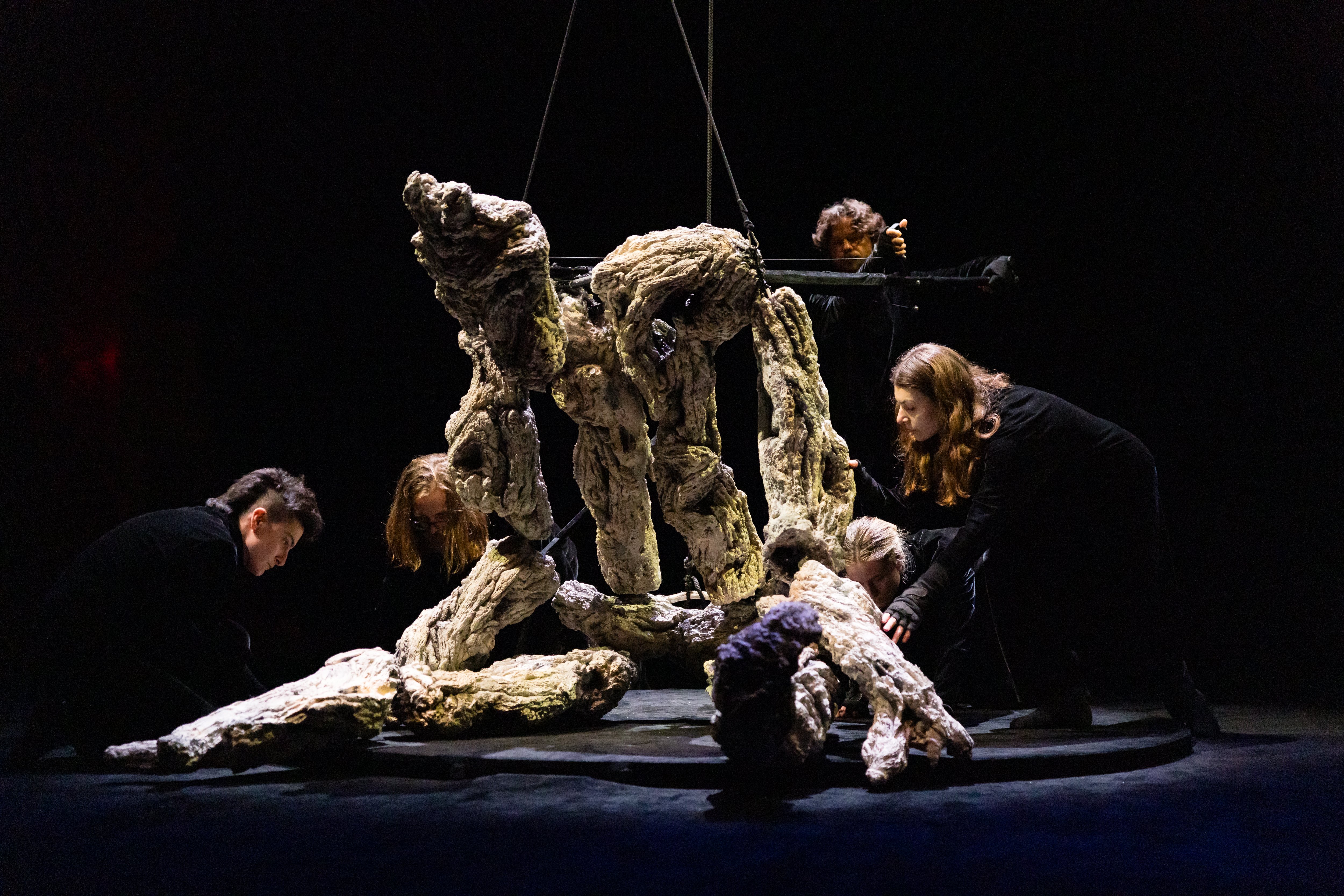Editor’s Note: This article is a review and includes subjective thoughts, opinions and critiques.
As a young child growing up in China in the ’80s, composer Huang Ruo didn’t have many toys. However, he was obsessed with Transformers, so much so that he would cheekily bribe his sisters’ boyfriends when they visited: a Transformer in exchange for his affection.
Little did he know, he would someday stage the ultimate Transformers — with puppets rather than action figures — in the “Book of Mountains and Seas,” a work of vocal theater dreamed to life with his collaborator, puppeteer Basil Twist.
The show played at Bing Concert Hall on April 6, with a pre-show talk where Ruo and Twist spoke about their intent and inspiration. The performance itself was a theatrical re-enactment of four ancient Chinese myths using puppets, percussion and vocals performed by the Ars Nova Copenhagen ensemble. Each myth took on its own life and message, exploring themes of the creation of the Earth, the stilling nature of bitterness and revenge, the impressive enterprise of human aspiration and the perils of unabated ambition.
In the program notes, Ruo writes “these myths will be reinterpreted through the lens of our modern-day relationship with the world we live in.” His pre-show rhetoric suggested the myths serve as a sort of cautionary tale, warning modern-day humans against excess ambition and the perpetuation of our environmental crisis. Indeed, Ruo writes “maybe in this apocalyptic moment of the world, nature gets the last laugh and will survive beyond us.”
However, I believe the piece’s meaning extends far beyond a forewarning. To put it starkly, the show’s puppetry highlights that myth has lost its place in the modern condition. When mythmakers were replaced by physicists, narrative was replaced by entropy.
When thinking of puppetry, one might first envision a gloved hand and a talking animal. However, Basil Twist’s puppets made for a full representation of natural landscapes, with puppets of rivers, birds, suns and giants. In his pre-show talk, he explained how he constructed the language of the show’s puppetry by using three materials to represent different elements: silk for water, cardboard for earth and paper lanterns for air. Twist argued that it is precisely the “humility of these materials,” the simplicity of the puppets’ construction, that invites the audience to transform them using their own imaginations.
On the musical side, Huang Ruo chose voice and percussion as his tools to tell these myths. He states that these are the “two most primitive sounds,” and that “if you try singing in a mountain, the sound will travel a lot further.” The show’s use of vocals made me recall Leonard Bernstein’s claim that singing is the most primitive act any of us has performed, as babies crying out for our mother’s breast.
Indeed, the primitive nature of Twist and Ruo’s world is a distinct feature of the production. The instruments and materials they chose were selected with precision to achieve simple yet beautiful staging.
Moreover, I believe puppetry is the ideal medium to invite the audience into a state of enchantment. The purpose of puppetry is to animate inanimate objects. “The latin verb ‘animare’ means to give life,” Ruo explained in his talk, and that is exactly what “Book of Mountains and Sea” did. Twist and Ruo invite us to look for moments where the puppeteers birth life into the production, moments when the ensemble begins to breathe and the puppet takes on a life of its own. I came out of the show convinced that to engage with puppetry is not only to exercise suspension of disbelief, but to actively practice believing.
I most vividly felt this way when watching the final myth, “Kuafu Chasing the Sun.” The 10-foot tall, Transformer-esque Kuafu, constructed of muscular limbs of wood, runs in place outstretching his arms for a sun forever out of reach. His hopes and fears were laid bare on the stage as he lept towards towards the sun, and out of desperate thirst, drank rivers until they were dry.
The music accompanying his exertion included marimba, windchimes, waterphones and violent drums: the sounds of an incarnate world — such was the soundscape of a world of meaning and value. The modern world, on the other hand, asks us to disavow the saying “the sun is going down!” and correct ourselves to the more accurate post-Copernican resolve: “the Earth is rotating east on its axis.” At the end of the day, sayings such as the former are microscopic, every-day myths we tell ourselves.
Although Huang and Ruo spoke about this piece as a response to our modern-day environmental crisis, I believe it reveals a far deeper insight. Captivated by Huang and Ruo’s world of make-believe, the audience slowly comes to the realization that this world of myth is irreconcilable with our modern world. We must then ask ourselves, why this disjunction?
I argue that the cause is a loss of willingness to believe. Although scientific progress has allowed us to aspire towards more accurate beliefs, it has also cleaved a scar in us. A God-less universe, subject only to the disincarnate whims of entropy, does not give us enough reasons to believe in anything — whether it be the notion of progress itself, or the simple hope that the future will be better than the past.
It is precisely this entropic view of the world that makes our moment in history an apocalyptic one. More than the climate crisis, “The Book of Mountains and Seas” unveils our generation’s socio-psychological crisis.
Now more than ever do we have advanced tools to solve the world’s problems. However, what we have lost — and perhaps what art can help with — is a little enchantment to believe. The same way a child, crouched in the corner of a barebones studio apartment in communist China, imagines Transformers taking flight.
